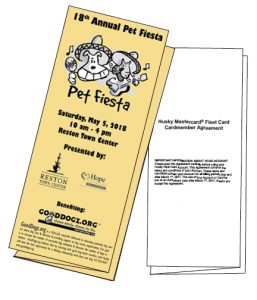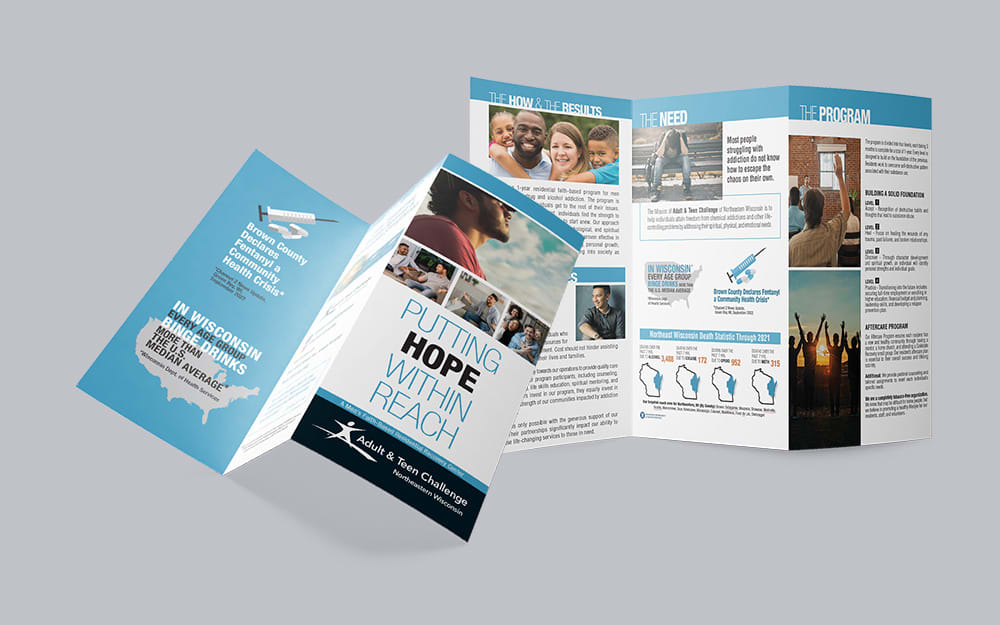Discovering the Different Design And Styles in Handout Printing for Your Service Needs
Handout printing offers a selection of design and styles that can significantly affect a company's interaction techniques. From bi-folds to tri-folds, each layout provides one-of-a-kind advantages for communicating messages. Understanding style aspects such as layout, color, and typography is crucial. However, the efficiency of these choices commonly depends upon deeper understandings. What elements should be considered to guarantee a pamphlet not just educates yet likewise involves its target market?
Understanding Pamphlet Kind: A Comprehensive Introduction
Pamphlets may seem like basic advertising and marketing devices, they come in numerous types, each serving distinct purposes and audiences. The most common types include bi-fold, tri-fold, and z-fold pamphlets. Bi-fold pamphlets contain a single sheet folded in fifty percent, making them perfect for simple messages or menus. Tri-fold handouts, which are split into 3 upright panels, are versatile and can accommodate comprehensive info, making them prominent for marketing materials and event brochures. Z-fold handouts, defined by a zig-zag folding pattern, supply a distinct format that can involve visitors with a visual story. In addition, some handouts may be developed for specific objectives, such as educational overviews, item directories, or academic sources. Recognizing these types allows businesses to customize their messaging successfully, making certain that their handouts resonate with their target audience and accomplish their advertising goals.
The Relevance of Layout Aspects in Handout Printing
Style elements play a necessary role in the effectiveness of pamphlet printing. Key elements such as color pattern, typography, and aesthetic pecking order greatly affect how details is perceived and retained by the target market. By very carefully considering these components, designers can boost readability and involvement, ultimately accomplishing clearer interaction.

Shade Schemes and Mixes
Color schemes and combinations play a pivotal role in the effectiveness of pamphlet printing, affecting both visual allure and viewers engagement. The selection of colors can stimulate emotions, establish brand name identification, and guide the visitor's interest to crucial details. Unified color palettes can enhance visual cohesiveness, while contrasting colors can create emphasis and draw focus to crucial components. For circumstances, a cozy color pattern may share power and excitement, while cooler tones can suggest professionalism and trust and calmness. In addition, cultural undertones of colors ought to be thought about, as they can vary significantly across different demographics. Inevitably, a well-balanced color pattern not only beautifies the handout yet additionally works as a critical device in interacting the designated message properly.
Typography and Readability
Typography functions as a foundation of pamphlet printing, greatly impacting readability and total message delivery. The choice of styles, dimensions, and font styles adds substantially to exactly how information is perceived by visitors. Clear, clear fonts improve comprehension, while excessively ornamental typefaces might hinder it. Moreover, the ideal font style size guarantees that message is easily legible from various ranges, accommodating diverse target markets. Line spacing and paragraph structure likewise play key duties in directing the reader's eye and promoting smooth navigation via the material. Regular typography creates a natural appearance, reinforcing brand name identification while making certain that necessary information attracts attention. Eventually, thoughtful typography selections can elevate a pamphlet's performance, making sure that its desired message resonates with the target market
Aesthetic Pecking Order Value
Reliable pamphlet printing rests on the calculated usage of aesthetic hierarchy, which guides visitors with the web content in an instinctive manner. By focusing on design components such as shade, size, and placement, organizations can effectively accentuate crucial messages and details. Bigger font styles can highlight headings, while contrasting colors can highlight crucial information. The setup of visuals along with message additionally plays an important role in directing the reader's gaze, guaranteeing that the most vital info is taken in initially. In addition, constant use spacing helps develop a tidy format that improves readability. Eventually, a well-planned aesthetic power structure not only captures passion however also facilitates understanding, making the handout an efficient tool for interaction and interaction.
Choosing the Right Layout for Your Message
Picking the suitable style for a handout is necessary to properly convey a message. Factors such as fold kinds, size factors to consider, and visual allure play considerable roles in boosting and engaging the target market readability. An appropriate layout can transform a simple message right into a compelling discussion.
Handout Fold Kind
When choosing a pamphlet's fold type, it is vital to ponder how the layout will certainly improve the message being shared. Different fold kinds serve different objectives, impacting both aesthetics and capability. The most typical options include the tri-fold, which uses 6 panels for information, making it ideal for in-depth web content. The bi-fold offers 4 panels, permitting for an extra uncomplicated, much less messy discussion. For an innovative strategy, the Z-fold provides a zigzag design that captures interest and can unravel into a longer narrative. Furthermore, eviction fold creates an interesting reveal, ideal for showcasing crucial information. Ultimately, choosing the right fold type assists in properly communicating the intended message while guaranteeing an appealing experience for the target market.
Dimension Factors to consider
The dimension of a pamphlet plays a considerable function in exactly how the message is received and understood. Choosing the right format can affect not just the web content's readability yet likewise the general impact on the target audience. Common sizes consist of letter-size (8.5 x 11 inches) for detailed information, and smaller sized layouts like half-letter (5.5 x 8.5 inches) for succinct messages. A bigger handout might enable even more visuals and thorough content, while a portable dimension can be easier for distribution. In addition, the designated use the handout-- whether for handouts, mailers, or screen-- should direct the dimension choice. Eventually, aligning the handout's dimensions with the communication goals is important for effective messaging.
Aesthetic Charm
Visual allure is crucial in pamphlet layout, as it directly affects audience engagement and message retention. The choice of layout plays a crucial duty in accomplishing this charm. Options such as tri-fold, bi-fold, or booklet layouts can impact exactly how information is presented and regarded. A tri-fold pamphlet, for example, provides a compact layout that urges simple handling and unraveling, while a bi-fold permits bigger images and even more substantial text. Including appealing graphics, a balanced shade palette, and understandable typography improves visual passion. In addition, thoughtful format and spacing contribute to readability. Eventually, picking the best style straightens the pamphlet's visual appeals with its desired message, ensuring that the audience not just notifications the pamphlet but likewise involves with its content properly.
Color Psychology: Effect on Target Market Involvement
Understanding shade psychology is important for efficient handout layout, as colors evoke details emotions and actions from target markets. Each shade possesses distinct organizations; for example, blue frequently shares trust and expertise, making it ideal for corporate pamphlets. Conversely, red can stimulate enjoyment and necessity, perfect for promotions or occasions that require instant attention.Green often signifies development and health, appealing to eco conscious target markets. Yellow, related to optimism and creativity, can draw attention properly yet ought to be conserved to prevent overwhelming viewers.Additionally, the combination of shades plays a vital function in engagement. Harmonious combinations can enhance readability and visual charm, while contrasting colors highlight vital information. By thoroughly choosing shades that line up with the intended message and target market, organizations can substantially affect audience perception and involvement, inevitably improving the efficacy of Learn More Here their pamphlet printing initiatives.
Tips for Effective Copywriting in Pamphlets

Measuring the Success of Your Pamphlet Campaign
While launching a pamphlet campaign can attract attention and generate interest, measuring its success is important for examining its effect and assisting future efforts. Key performance indications (KPIs) play an important duty in this analysis, consisting of response rates, consumer questions, and conversion rates. Businesses can track these metrics through various methods, such as studies, internet site analytics, and straight feedback.Additionally, examining the geographic distribution of feedbacks can expose which demographics resonate most with the pamphlet's web content. Contrasting the project's performance versus set objectives makes it possible for business to identify if objectives were satisfied and identify locations for improvement.Furthermore, gathering qualitative information with customer endorsements or emphasis groups can provide much deeper insights right into the pamphlet's performance. Eventually, a comprehensive evaluation of both qualitative and quantitative metrics allows businesses to fine-tune their methods, making sure that future pamphlet campaigns are much more impactful.
Frequently Asked Concerns
What Is the Typical Turn-around Time for Pamphlet Printing Orders?
The regular turnaround time for handout printing orders varies based on intricacy and quantity, normally ranging from a few days to a pair of weeks. Elements affecting this include style details and the printing company's work.
How Can I Minimize Costs Without Jeopardizing Handout Quality?
To decrease prices without endangering top quality, one might think about using easier designs, choosing conventional sizes, purchasing in mass, or picking less costly paper. pamphlet printing near me. These strategies can help preserve a specialist look while minimizing expenses
Are There Eco-Friendly Options for Pamphlet Printing Available?
Environment-friendly alternatives for pamphlet printing are increasingly offered. Lots of firms currently offer recycled paper, soy-based inks, and sustainable printing procedures, allowing services to minimize their ecological influence while keeping top quality and visual appeal.
Can I Print Pamphlets in Different Sizes Than Standard Options?
Yes, pamphlets can be printed in numerous dimensions past basic alternatives. Several printing solutions supply personalized measurements, permitting people and services to tailor their pamphlets to specific needs and preferences, click to read more enhancing their promotional performance.
What Kinds of Paper Are Ideal for Pamphlet Toughness?
When thinking about pamphlet resilience, thicker paper options like cardstock or coated coatings are suggested. These materials provide boosted resistance to damage, ensuring that the handouts preserve their high quality over time, despite having regular handling. Color systems and combinations play an essential role in the performance of pamphlet printing, influencing both visual allure and visitor engagement. Aesthetic charm is vital in pamphlet design, as it straight influences target market involvement and message retention. Comprehending color psychology is essential for efficient handout style, as shades stimulate details feelings and responses from target markets. Each color has distinct organizations; for instance, blue usually conveys trust fund and expertise, making it appropriate for company pamphlets. Efficient copywriting is fundamental to the success of pamphlets, matching the aesthetic elements, consisting of color options that record attention.